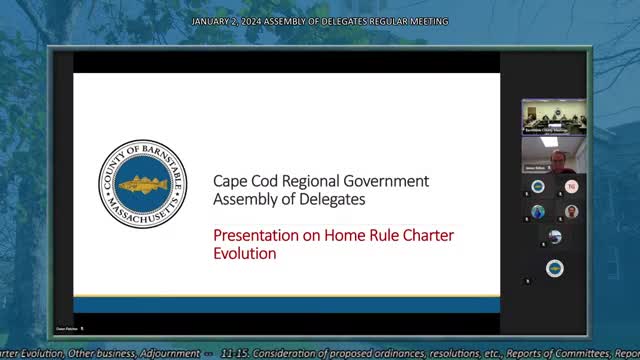Clerk reviews charter history and advisory-board changes; delegates seek documents on legislative intent
Get AI-powered insights, summaries, and transcripts
Subscribe
Summary
The assembly's clerk delivered a detailed history of the county charter and the evolution of the advisory board on county expenditures into the assembly's budget-review role. Delegates requested slides and legislative-intent documents to clarify whether and how advisory-board powers were transferred to the assembly.
The assembly received an extended overview of the Barnstable County Home Rule Charter and the historical evolution of the advisory board on county expenditures. The presenter traced the shift from an advisory board with growing budgetary authority (1973 onward) through the special-act charter adopted in 1988 and subsequent charter revisions that moved budget-review functions toward the assembly.
The presenter noted that the 1988 special-act charter (chapter 163, Acts of 1988, as discussed in the presentation) created an elected assembly with weighted votes by town population, while retaining an advisory board for county expenditures. Later charter review activity in 1999–2000 led to language changes that the presenter said effectively incorporated advisory-board duties into the assembly's standing committees; the presenter cautioned that the charter language is complex and that some transitional provisions remained in later charter text.
Delegates asked for documentary evidence and minutes underlying the changes. Delegate Green (Wellfleet) asked that the slides be shared so members could review them; other delegates requested the report and minutes cited in the presentation. The clerk indicated those minutes and reports exist and said staff would provide the materials, including testimony and a report from the charter review committee that shaped the 2000 revisions. Deputies and delegates discussed that the charter's text supersedes inconsistent general laws when enacted as a special act and noted there are court interpretations and county-counsel opinions that bear on the question of budget authority.
The clerk recommended that the assembly schedule a charter-education session (a special meeting was proposed for the 8th) to cover the manual of governance, budget process, administrative code and other items. Delegates also raised procedural points about placing "future business" items on agendas and requested earlier committee assignments so they could begin substantive work.
No formal legislative action was taken on charter revisions; delegates asked staff to circulate the historical documents and scheduled education and training sessions to continue the discussion.
